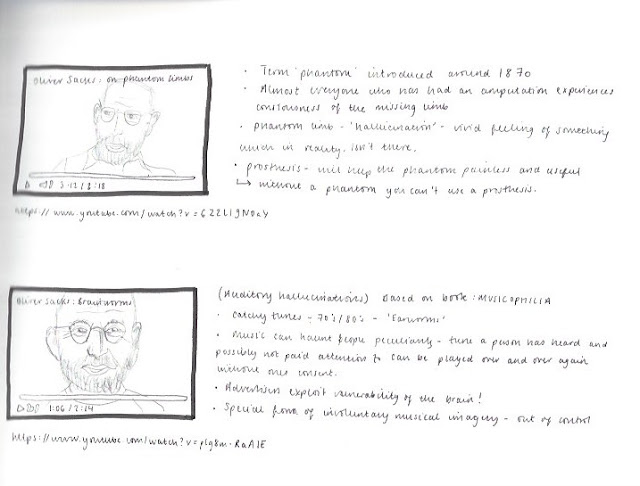I watched a total of four videos today surrounding different areas of neurology and Sacks' personal interests:
- Writing https://www.youtube.com/watch?v=DrlmwEfXg7Y
Most of Sack's writing has gone into his clinical notes; they were lengthy and details and were 'read like novels'. The pleasure of writing takes him to another place and gives him a pleasure like no other, he could write non stop, until he could no longer see the paper. The act of writing seems as fresh and as fun as when he first started it nearly 70 years ago.
- Amphetamines https://www.youtube.com/watch?v=usKNev3vTBo
A lot of Sacks' weekends were spent taking 'virtual trips' with the help of drugs such as LSD and Cannabis. As he devoted the entirety of his weekdays to his patients, he would spend his weekends 'away', not knowing that he could easily become very close to death.
He described the ecstasy of amphetamines as 'mindless', 'the pleasure was essentially complete, although completely empty'.
- Phantom Limbs https://www.youtube.com/watch?v=6Z2LI9Nk0aY
Phantoms as an experience have existed as long as humans have had bad limb injury, almost everyone who has had an amputation tends to have some consciousness of the missing limb.
Hallucination- vivid feeling of something that is not in reality, there- thats why the phantom must be so.
If you have lost a limb, you NEED a replacement. If left alone, a phantom can shrink and become painful. A prosthesis will keep the phantom alive and therefore useful and painless.
- Brain Worms https://www.youtube.com/watch?v=plg8m-RaAlE
(Auditory hallucinations) The Germans called them 'ear worms', boring the way into the ear and the brain.
Music can haunt one peculiarly. Things can play and replay without consent; usually a fragment e.g. 3 or 4 bars- very often used in advertisements. Advertisements can exploit this vulnerability of the brain.




No comments:
Post a Comment